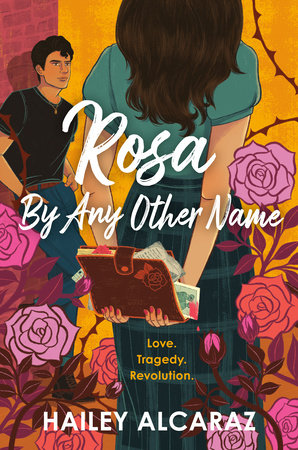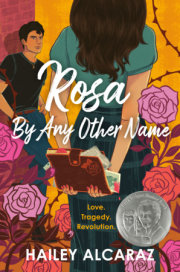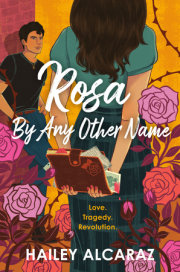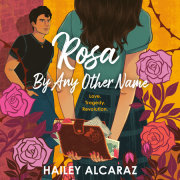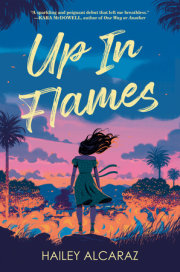OneThursday, August 18, 1955I woke before the sun, in near silence. Such a rare thing in our barrio. No rumble of overworked pickup trucks chugging between fields of crops on dirt roads. No neighbors calling across fences to borrow a few eggs or a cup of milk. No scampering of feet or slamming of doors or music or . . . anything, really. Nada. Just the rustle of leaves in a gentle breeze, the faint cooing of a mourning dove, and my own pulse. Fast but steady.
It's the first day of school, I thought, scarcely a heartbeat before the rhythm and ruckus of our morning routine came roaring to life with my mother's approaching footsteps.
"Rosa, hija, ¿estás despierta?" Mamá's voice called out onto the sleeping porch from the kitchen. She didn't wait for me to answer before busying herself with her next task. I could hear her set a pan on the stovetop, could hear the rhythmic ticking of the gas burner trying to catch.
"Sí, Mamá," I responded, swinging my legs out of bed at the same time she repeated her question with a hitch of impatience. Mornings were not a time for idleness. I shrugged my robe on, tying the belt in a loose knot over my white nightgown as I made my way inside.
Mamá was already dressed, setting a plate of fresh tortillas on the table. She wore her usual long-sleeved cotton dress and headscarf to protect her from the sun on the long days spent in the fruit fields. The radio, a big old Westinghouse that sat on its own table in the living room, exuded a steady stream of music, the melodic thrum of the guitar and accordion competing with the noises of my mother's rapid movements. She wasn't one to indulge in many frivolous activities; we didn't own a television, and I'd scarcely seen her sit down to read anything longer than a recipe-but morning radio was her one vice. There weren't a lot of Spanish language options-even in Phoenix, where there were so many of us who spoke Spanish-but early in the morning, before sunrise there was En este momento, a Spanish show targeted at all the farm laborers and workers who rose before the sun.
It was much warmer in the kitchen than it was on the sleeping porch, and already I missed the cool solitude of the cot I slept on in the summer months.
"Buenos días," Mamá said with a quick smile, though she did not stop moving, did not even slow down-gliding back and forth between the stove, table, and counter. "¿Qué estabas haciendo?" Her brows pinched together as her eyes darted up at me over the eggs sizzling in her pan.
Even though it was early, I knew what she meant; she wasn't really asking what I had been doing. She was worried, and what better way to show it than by prodding with questions she already knew the answer to. "Just waking up," I told her, forcing a smile to assure her that I hadn't been lying in bed for hours, contemplating what lay ahead, like she feared. The metal kitchen chair screeched against our floor as I pulled it out and sank into it.
She made a quick humming sound. "Mi querida, are you excited for school?" she prompted, switching to English and adding a cheerier lilt. Though her English was heavily accented and often interrupted by bits of Spanish, she tried to use it with me as often as she could so we could both work on smoothing out the edges of our accents. Mine was almost nonexistent at this point, but it would pop up on the most unexpected words, especially when I was nervous or distracted. Mamá had always thought it was important to speak in clear American English, no long vowels or rolling r's. Even though I understood why she felt so strongly about it, it still made me a little sad to listen to her squash out her native tongue with the kind of unyielding force I'd seen Papi use to crush scorpions underneath the heel of his work boots.
"I ironed your skirt for you," she said before I could respond. "And your lunch is just over there." She tipped her chin at a paper sack to her right.
"Gracias, Mamá."
She shot me a look over her shoulder. "Oye, you need to eat something. You can't go to school on an empty stomach."
"Yes, Mamá," I murmured, setting a small scoop of frijoles onto my plate obediently. I could feel the genuine concern underneath her busy fussing. Even after a year of going to school on the north side, deep down I still felt a lot of the same anxiety my mother did about our situation.
And with good reason, of course.
What we were doing-what I was doing-was dangerous. Integration was happening, sure. The courts told us that it had to, but it wasn't nearly as quick or easy as those folks in Washington seemed to think it was. Race mixing was messy business, no matter how you looked at it.
Just because I was allowed to go to school at North Phoenix High didn't mean I was welcome.
"And your bus money?" Mamá continued, reaching over to smooth my hair. "You'll remember to comb your hair back, yes? It's gotten so long. Maybe I should've cut-"
"Mamá."
She swept one last lock away from my forehead and sighed, turning back to the sink.
A few minutes later, Papi joined me at the table, his movements purposeful and urgent-as always-as he dug into the huevos and papas Mamá had placed in front of him. He began talking about the workday ahead of them at the citrus farm with barely a pause after he wished us a buenos días. He worried about the heat, about one of his friends who hurt his back the day before, about the foreman who always popped up at the wrong time.
"Oye, Maria, pack some extra napkins in my lunchbox, will you? My hands were so sticky yesterday"-he paused suddenly to shoot me a scowl, his cheeks full of food. "Why do you look so . . . ?" He gestured his fork at my face obscurely.
Mamá glanced at us, nodding in agreement as she placed an empty coffee mug in front of my father. "Sí, sí. I thought so too."
I struggled to soften my expression into something more pleasing for my parents. "I don't know what you mean," I mumbled feebly.
Mamá reached toward me, placing a warm calloused hand on my forehead. "No está enferma."
Papi snorted in relief, busying himself with pouring a splash of steaming hot water into his cup from the kettle Mamá handed him. "Good. What a day to be sick that would be, eh?" He wrenched open the lid to the Taster's Choice, scooping a generous spoonful of instant coffee into his mug. His dark eyes flitted up to meet mine every few words, watchful and concerned. "You're not too tired, are you? I told you it wasn't a good night to meet up with Ramón, didn't I? The night before your first day of school, Rosa?" His spoon ping-pinged in his mug as he stirred. The bitter, acidic scent of the coffee wafted between us.
"I'm not tired. I was home before supper."
Another grunt from Papi's end of the table. "You can't be exhausted if you're going to school with the gringos, hija. You have to be at your best all the time."
"I know that."
"You know how important this opportunity is," he said, his volume growing louder as he navigated toward a conversation we'd had countless times. A familiar lecture since I switched schools last year. "You must take it seriously, Rosa. You can't spend all your time and energy playing with the chico down the street like you used to when you were a child, eh? You're a young woman now. Almost an adult."
With a sigh, I gave him a slow nod. "Yes, Papi."
"And you must be aware!" Mamá chimed in, her pans clattering into the sink. "You must always be thinking a step ahead. If you are tired, you put yourself at risk, ¿verdad?"
She waited for one more dutiful nod from me before she continued scrubbing the pan in her hands. I turned my gaze down to my plate as I moved my now-cold egg around with the tip of my fork. I thought about the day that lay ahead of us. Me, across town at North Phoenix High School pretending I was just like all the white kids, with their new books and excited whispers about graduation and college and summers spent at the Valley Ho or whatever hotel they'd whiled away their days at sitting by the pool. Passing. Using my fairer skin to slip in undetected, despite the prejudices that led to de facto segregation. Segregation, not because anyone said we had to but because white folks wanted it.
And then I thought of my parents, plucking bushels of oranges on the south side as the scorching sun coasted across the sky. My heart began to quicken, competing with the blare of trumpets on the radio, and I worried my face had worked itself into whatever expression had put my parents on edge.
I took a breath, searching for that tranquil silence I'd been able to summon in bed.
Instead, my thoughts shifted to last night.
I thought of sitting in the shade of the Montoyas' mulberry tree, Ramón strumming his guitar as he made up joking songs about how he and the rest of the kids in our barrio didn't have to go back to school until Monday, how he still had four more days of jumping into the canals and sneaking into the dance halls and catching double bills at the drive-in.
"Aren't you supposed to be cheering me up?" I'd said, giving his high-top a kick.
He grinned. "Says who?"
I made a face. "Isn't that what friends are for?"
"You know you can't wait to get back to that place, Rosita," he half sang. "You love school. You've been bored for weeks, monkeying around Golden Gate with the rest of us."
I considered this and the easy way he said it. Like it was obvious. Like it was something everyone knew.
His fingers danced across the guitar strings, playing a familiar rhythm, a little number he'd written about me when we were little. "Rosita, Rosita, Rosita," he'd croon. "Una chica astutita."
I could hear the words in my head without him singing it. Only, I didn't feel like a clever girl. Not at all.
"I suppose" was all I could manage in response. "But it's still . . ."
He stopped strumming as I searched for the right word, the melody fading as he waited. When it became clear I didn't know what I was trying to say about my life at the white high school, he just nodded, understanding anyway. Always understanding, even when I wasn't sure I did. Perhaps especially when I didn't.
"It's one more year, huh?" he said at last. "What's one more year of passing, when it's all said and done, hmm? You know you can do it. You can do anything. You're Rosa Capistrano." There was a teasing note to his voice, but his smile-that full-lipped smile that had broken the hearts of dozens of girls from here to the Rio Salado-was as sincere as they came. "Or . . . should I call you Rosie Capistrano?"
I rolled my eyes, kicking his shoe again. "Please don't," I'd begged as he laughed.
Even in the kitchen, amid the flurry of my parents' fears and my own racing heart, I felt a wave of peace-of belonging-inside me at the memory. The evening sun on my face, Ramón's joking and singing and laughing. The easiness of being with my closest friend, someone who knew me like he did. Ramón was perhaps the only person who truly knew me back then.
Mamá took my face in her hands one more time, jolting me from my thoughts, her palms warm and slightly damp. I felt her thumb brush at something on my cheek as she held me. "Be careful, ¿eh?" There was a tightness in her voice that I could tell she was trying to hide.
I nodded as Papi rose and made his way to the front door. I saw a trace of the same unease in his eyes as he watched us. "I will. I can do this. It's just one more year, right?" They didn't know I was just repeating Ramón's words.
"One more year," Papi reiterated from across the room, his voice firm and resounding.
One more year-of passing, of lying, of this dangerous deceit.
I knew I was lucky to have access to the same education all the white kids had, just because my skin happened to be a few shades lighter than the rest of my family's. It was my duty to use that privilege to do something with my life.
This was what Papi and I had discussed from the very beginning, when we decided I wouldn't enroll in the new school that had opened for south side kids-for Mexican and colored kids-like I was supposed to. It's what had been on his mind ever since he returned from the Second World War, and it's what led to this decision-this deception. It was our reason for . . . everything, really.
"Te quiero, mija," Mamá said softly. "We'll see you this evening. Be safe." She kissed my cheek, and with a quick wave, both my parents disappeared through the front door.
"That was 'Los caballeros alegres,'" the familiar deep voice on the radio told me as the upbeat tempo of the previous song faded out at the same moment our door clicked shut. "And as always, I am your friend Victor, here to bring you your daily dose of Mexican culture, art and social issues, En este momento."
Alone at last, I took a deep breath.
Copyright © 2025 by Hailey Alcaraz. All rights reserved. No part of this excerpt may be reproduced or reprinted without permission in writing from the publisher.

